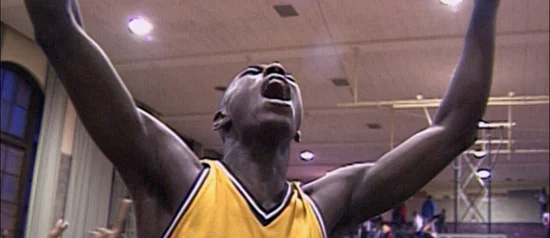The ultimate irony at the core of Steve James’ enduring Hoop Dreams is that we know that success has a limit. Even in the event that William Gates and Arthur Agee pursue their dreams and display their natural talent in the NBA, its ambiguous whether their personal success will match up with career heights. With an example set first by Isiah Thomas and then by Michael Jordan, it’s inherently tragic to realize this is all Arthur has when the institutions he abides by don’t let him to go pro. While some stories of those legendary athletes can be applied to any kid who has similar aspirations, it’s the details from the Thomas and Jordan path to the NBA which aren’t as famous that reveal this reality of failure. “Failure” is a heavy word, and I hesitate to apply it entirely to William and Arthur; it’s just unreal at multiple times in Hoop Dreams when you can point to things going differently.
I could watch Arthur and William for hours. Their home life and struggles with school are intriguing, and the use of basketball as a structural analogy for race, class, and America is so well put together. This goes to benefit the natural and deeply human characterization of William and Arthur as they don’t make it big for different reasons, yet there is a tangibility between the two, as coming up in the same generation gives an indescribable relatability. Documentary filmmaking is one of my favorite genres, owing to the vulnerability that can be captured through great subjects like these. Famously, Hoop Dreams was set to be only a half an hour; its final running time is nearly 3 hours, and never feels it. Even if we know going into this viewing of the film that neither of the boys will make anything of themselves, it’s ironic that they can make it so dramatically satisfying.
It is in this trust with a conception that leads to a conclusion, by all accounts brought by personal tragedy (like the passing of William’s dad) framed by self-discovery. Not that these must be realized in the moment, as when William’s knee injury is ignored by coaches and friends until it can’t be. Bodily harm and even height growth are just a few reasons why William is weeded, out even with natural athletic ability. With immense pressure for an even smaller chance of making it big out of St Joesph’s, the well-meaning scouting agents come with much more pressure. The runtime can grant this access by having this become a cycle of stagnation; neither William nor Arthur believes the world is out for them, yet they rarely seem to think the world is for them. I’m reminded of something in the vein of what the Safdie brothers did with Lenny Cooke; a next generation’s response to a cycle far from gone, when we see players with potential when it just wasn’t their time to play.
Really, Lenny Cooke carries on a similar story to Hoop Dreams. Cooke, being about a highly anticipated high school basketball player for 2002 NBA draft who went on to become unselected, also conveys a similar feeling as that which Steve James was able to evoke. Despite the commentary on class, institutions, or America, we are left with this sense of unease and absence in life. With much being left unsaid, it’s a haunting descent into what could’ve been for these aspiring athletes, and while we are left to ponder, life went on for them. Hoop Dreams is still the best documentary of the ’90s– and one of the best ever– that feels as though it were made yesterday.
Hoop Dreams
1994
dir Steve James
171. minutes
Screens Thursday, 3/23, 7:00 pm @ Coolidge Corner Theatre
Part of the ongoing series: Big Screen Classics


